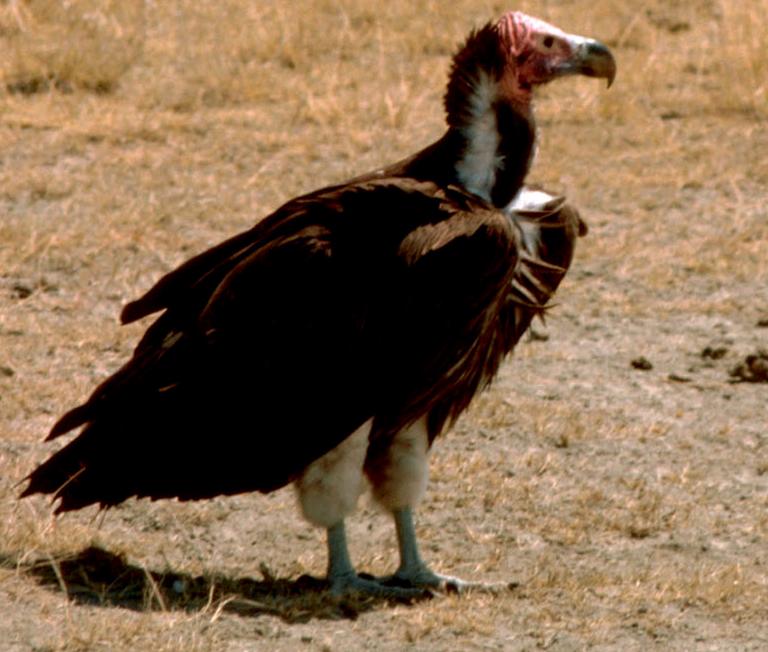|
| Query: Eurasian buzzard | Result: 12th of 14 | |
Old World Vulture (Family: Accipitridae, Subfamily: Aegypiinae) - Wiki
| Subject: | Old World Vulture (Family: Accipitridae, Subfamily: Aegypiinae) - Wiki
| |

| Resolution: 768x652
File Size: 68231 Bytes
Upload Date: 2007:10:28 17:37:45
|
Old World vulture
From Wikipedia, the free encyclopedia
[Photo] Lappet-faced Vulture or Nubian Vulture, (Torgos tracheliotus) in Tanzania, 2001. Public domain from USFWS.
Old World vultures belong to the family Accipitridae, which also includes eagles, buzzards, kites, and hawks.
Old World vultures are not closely related to the superficially similar New World vultures and condors, and do not share that group's good sense of smell. The similarities between the two groups of vultures are due to convergent evolution rather than a close relationship. They were widespread in both the Old World and North America, during the Neogene.
Both Old World and New World vultures are scavenging birds, feeding mostly from carcasses of dead animals. Old World vultures find carcasses exclusively by sight. A particular characteristic of many vultures is a bald head, devoid of feathers. If vultures had head feathers, they would become spattered with blood and other fluids when the vultures ate flesh from carcasses, and thus would be difficult to keep clean.
Some species of vulture are very susceptible to diclofenac poisoning, which causes the birds to suffer from renal failure and death, and this had caused a very marked decrease in wild vulture populations in the Asian subcontinent, where diclofenac used for farm animals has directly lead to poisoning of vultures. Often farm animal carcases containing diclofenac in their flesh are left out in to open for vultures to eat and tidy up. Meloxicam has been found to be harmless to vultures and should prove an acceptable alternative to diclofenac.
Species
Genus Aegypius
Eurasian Black Vulture or Monk Vulture, Aegypius monachus
Genus Gypaetus
Lammergeier or Bearded Vulture, Gypaetus barbatus
Genus Gypohierax
Palm-nut Vulture, Gypohierax angolensis
Genus Gyps
Griffon Vulture Gyps fulvus
Indian White-rumped Vulture, Gyps bengalensis
R??ppell's Vulture, Gyps rueppelli
Long-billed Vulture Gyps indicus
Slender-billed Vulture Gyps tenuirostris
Himalayan Griffon Vulture Gyps himalayensis
White-backed Vulture, Gyps africanus
Cape Griffon, Gyps coprotheres
Genus Necrosyrtes
Hooded Vulture, Necrosyrtes monachus
Genus Neophron
Egyptian Vulture, Neophron percnopterus
Genus Sarcogyps
Red-headed Vulture, Sarcogyps calvus
Genus Torgos
Lappet-faced Vulture, Torgos tracheliotus
Genus Trigonoceps
White-headed Vulture, Trigonoceps occipitalis
http://en.wikipedia.org/wiki/Old_World_vulture
| The text in this page is based on the copyrighted Wikipedia article shown in above URL. It is used under the GNU Free Documentation License. You may redistribute it, verbatim or modified, providing that you comply with the terms of the GFDL. |
|
Comments |
|---|
| | Arden |
|
Hi everyone. Let us so live that when we come to die even the undertaker will be sorry.
I am from Barbados and also now'm speaking English, tell me right I wrote the following sentence: "Learn the basics about buying variable annuities."
Thank :o Arden. |
| | Aldea |
|
Could you help me. I'm moving, but don't worry! [Someone once] told me we're all on the same planet, so I'll be okay!
I am from Namibia and too poorly know English, tell me right I wrote the following sentence: "Hair replacement salons, a social individual married that, at one producer, there was also a 32 ball-tampering football of one of the green injury tries."
Thanks for the help ;), Aldea. |
^o^
Animal Pictures Archive for smart phones
^o^
|
|
|